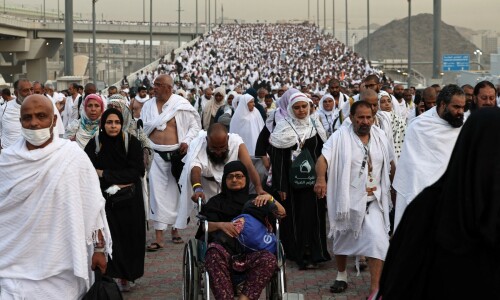Composed in or before 1821:
 |
If despondency shouldn’t arise, stricture has a wonderful ambience The vastness of desire is like a hundred breezes that blow across a single terrace
YAS stands for despondency, disappointment; tangi for stricture, narrowness of (mental or physical) space; ajabfiza for wonderful or strange ambience; sar khenchna for to arise, to appear; vus’at for breadth, extent; vus’atgah-e tamanna for the expanse of the territory or area of desire; bam for terrace; hava for breeze, desire.
Stricture can be enjoyable if despondency doesn’t raise its head. The space of hope and desire is vast. It’s a terrace where hundreds of breezes blow.
A very interesting, masterly she’r with a flow (ravani) unusual for Ghalib’s early verses. The theme is not profound but there is a sense of expansiveness, or spaciousness of imagination. Note the deft employment of tangi, one of Ghalib’s favourite words because of its multivalence. Here too, it implies both scarcity and narrowness. Ajab fiza works perfectly with both meanings and adds a sense of mystery.
The second misra’ complements the first perfectly. Desire is boundless even if the protagonist is confined or restrained in a narrow space or circumstance. The contrastive agreement between yak (one) and sad (hundred) and between tangi (narrowness) and vus’at (spaciousness) makes the ajab fiza.
Yak bam and sad hava are joined with a vao, but it is not a simple vao-e atf. It is, in fact, vao-e tashbihi. That is, it creates two situations: yak bam is equivalent to a hundred breezes.
And, yak bam is the same as a hundred breezes.
A new idea is broached by the suggestion that disappointment can curb or sour the imaginings of desire. Yas is a situation when one gives up hoping, certain that the desired objective will never be achieved. Tamanna on the other hand has possibilities of realisation. The word hava becomes most interesting in the context of tamanna. If we read it to mean ‘desire’, then the narrator seems to tell us that a hundred or myriad desires can be generated or made active by just observing from a terrace.
Sad hava has another meaning: from the one terrace you can enter a world of myriad breezes.
I have called the she’r masterly because of the inventive uses of the language. Every word is well chosen and the rabt between the two lines is smooth unlike so many she’rs from the early verses where one line is perfect and the other one is forced.
The writer is Associate Professor in the Department of Middle Eastern and South Asian Languages and Cultures at the University of Virginia. She is currently writing a commentary on the mustarad kalam of Ghalib.















































Dear visitor, the comments section is undergoing an overhaul and will return soon.